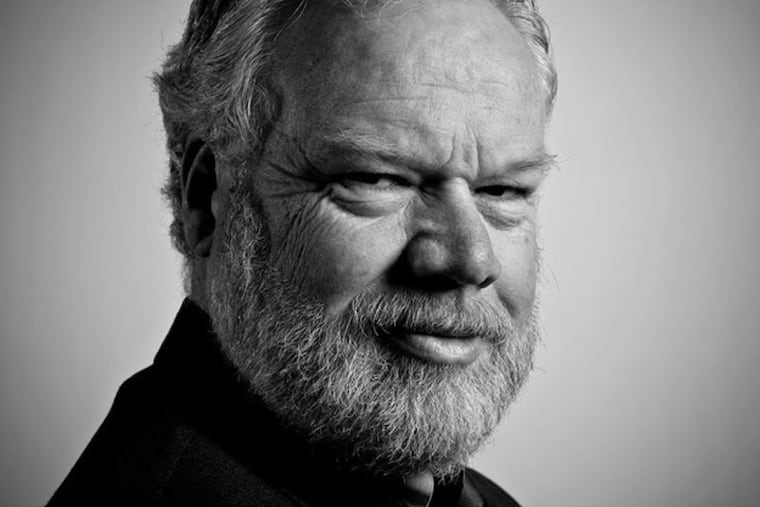Visiting author Tom Ricks talks Churchill, Orwell, freedom
Thomas E. Ricks comes to the Free Library Thursday night. In his new book, "Churchill and Orwell: The Fight for Freedom," he argues that these two mountainous figures discovered the question of their times (and ours): How to protect individual liberty from the all-intrusive state and corporation.

Thomas E. Ricks, Pulitzer-winning writer and reporter, has written of war and generals, strategy and geopolitics. He does something a little different in his
latest book, Churchill and Orwell: The Fight for Freedom: He pairs those two mountainous figures of the 20th century and discovers a momentous, era-defining link.
"It turns out the big question was not Freud and the subconscious, not Marx and the revolution of the masses," Ricks says. "It was, 'How do you protect individual liberty, thought, and expression from the all-intrusive state and the all-intrusive corporation?' "
Ricks visits the Free Library for a free reading at 7:30 p.m. Thursday. In an interview, he shared additional thoughts about Winston Churchill, George Orwell, character, and history.
These are obviously two of the great voices of their time. Yet no one ever paired them in a book before. How come?
If there were a book that tied them together, I'd have seen it. The way I came to it was that these are two heroes and role models of mine. I'm a war correspondent just as they each had been. And I'd been going back, reading a lot of 20th-century journalism, asking, "Who stands up? Who still speaks to us?"
H.L. Mencken didn't. S.J. Perelman didn't seem funny. Hemingway seemed stale and out of date. Then I picked up Orwell, and I said, 'Wow. Why does this feel so fresh, immediate, for our times?' And I've always been a Churchill fan. They're so different, down even to their flaws, yet both really spoke to today as few of their contemporaries do.
Is it fair to say that the stature of both has grown largely in retrospect?
What you see from Churchill's second term as prime minister is that by conventional standards, he was a failure as a politician. And Orwell in the late 1940s was seen as a marginal figure – yet I can't think of another author whose impact has grown as much as Orwell's has. In the 1950 edition of Bartlett's Quotations, there is only a single one from him. As of today, he is a major contributor to our language and ways of thinking, with coinages such as Big Brother and newspeak, which has taken on new energy in the debate about 'fake news.'
Besides clarity of vision, there is a fairness in both, a willingness to slap both left and right.
Both show incredible character in the 1930s that actually hurts them. Churchill warns everyone about the fact that the Nazis are rearming, and for this, Neville Chamberlain refuses to have him in the cabinet. Orwell comes back from the Spanish Civil War and says that both sides, not just Franco's, were guilty of atrocities, that the left was lying as much as the right was. That leads some to disown him for disloyalty.
Part of being honest is being willing to blow the whistle on your own team when they deserve it. Both said, 'You can't suppress the facts in support of a political goal.' Which is so different from our own time.
It's fascinating: This time out, you're not writing about generals; you're writing about a politician and a writer.
Two writers. Churchill had pervasive impact as a writer. He actually made his living by writing: more than 15 million words. Besides his histories, you have his public speaking. His "War Speech" of Dec. 3, 1939, is said to be the moment Churchill became Churchill, when he said that the coming conflict was 'a war … to establish, on impregnable rocks, the rights of the individual.' And so many of the prominent leaders of the next half-century read him deeply.
With Orwell, you have Animal Farm in 1945 and Nineteen Eighty-Four in 1949, and, even now, decades past 1984, these two books are massively influential, still seen as dangerous, because we now see clearly what they really are: parables about the abuse of power. Thai authorities don't like finding copies of Nineteen Eighty-Four in your bags at the Bangkok airport. There's a reason for that.
Your "Afterword: The Path of Churchill and Orwell" is a magisterial closing flourish in which you take their great theme, the fate of individual freedom, through time.
These two caught the essence of their time. The book ultimately came down to applying what they saw so clearly. I was really happy to have the opportunity to bring it through Lincoln and Martin Luther King and the Eastern Europeans Orwell influenced so much. A line of honorable people. That Afterword felt to me almost like my last will and testament as a journalist.
Thomas E. Ricks reads from Churchill and Orwell: The Fight for Freedom 7:30 p.m. Thursday at the Parkway Central Library, 1901 Vine St. Free. Information: 215-567-4341 or libwww.freelibrary.org.